(中英)成品油市场管理办法
成品油市场管理办法
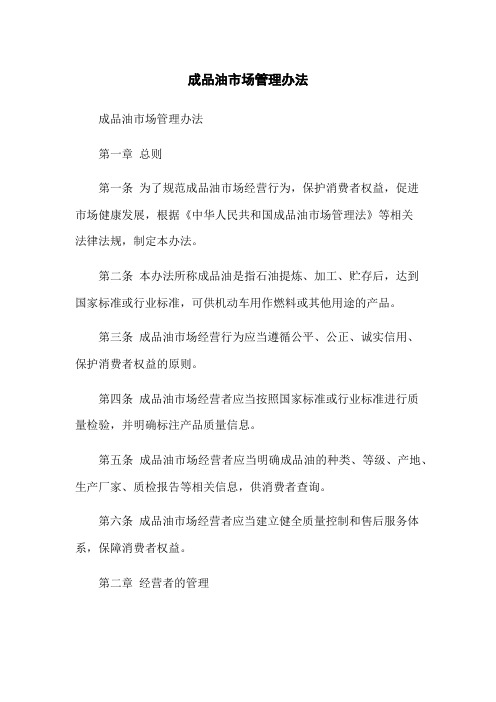
成品油市场管理办法成品油市场管理办法第一章总则第一条为了规范成品油市场经营行为,保护消费者权益,促进市场健康发展,根据《中华人民共和国成品油市场管理法》等相关法律法规,制定本办法。
第二条本办法所称成品油是指石油提炼、加工、贮存后,达到国家标准或行业标准,可供机动车用作燃料或其他用途的产品。
第三条成品油市场经营行为应当遵循公平、公正、诚实信用、保护消费者权益的原则。
第四条成品油市场经营者应当按照国家标准或行业标准进行质量检验,并明确标注产品质量信息。
第五条成品油市场经营者应当明确成品油的种类、等级、产地、生产厂家、质检报告等相关信息,供消费者查询。
第六条成品油市场经营者应当建立健全质量控制和售后服务体系,保障消费者权益。
第二章经营者的管理第七条成品油市场经营者应当依法注册登记,取得相应的许可证或执照。
第八条成品油市场经营者应当具备相应的生产、经营条件,并定期进行自查与自评,以确保自身符合相关法规要求。
第九条成品油市场经营者应当建立完善的质量管理制度,并进行相应的培训和定期检查,以提高成品油质量和经营水平。
第十条成品油市场经营者应当建立健全的市场监测和风险评估机制,及时掌握市场变化,消除安全隐患。
第三章产品质量管理第十一条成品油市场经营者应当与生产厂家建立稳定的合作关系,确保供应的成品油符合国家标准或行业标准。
第十二条成品油市场经营者应当对进货的成品油进行质量检验,并保存相关检测报告和凭证。
第十三条成品油市场经营者应当对存储过程中的成品油进行监测和检测,确保其质量稳定。
第十四条成品油市场经营者应当建立成品油质量追溯制度,便于查找和追踪成品油质量问题的起源和责任。
第四章售后服务与投诉处理第十五条成品油市场经营者应当建立健全的售后服务制度,提供消费者咨询、投诉处理等服务。
第十六条成品油市场经营者应当及时回应消费者的投诉,并按照相关法规进行处理,维护消费者权益。
第十七条成品油市场经营者应当积极参与消费者维权活动,加强与消费者组织的沟通和合作,共同维护市场的公平有序。
成品油市场管理办法
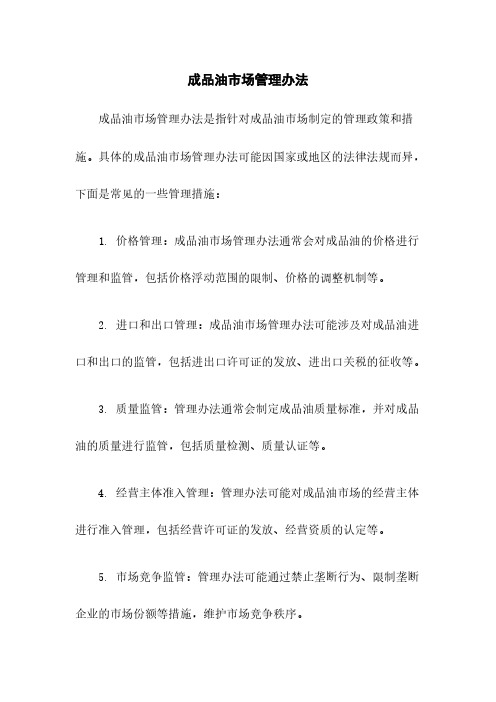
成品油市场管理办法
成品油市场管理办法是指针对成品油市场制定的管理政策和措施。
具体的成品油市场管理办法可能因国家或地区的法律法规而异,下面是常见的一些管理措施:
1. 价格管理:成品油市场管理办法通常会对成品油的价格进行管理和监管,包括价格浮动范围的限制、价格的调整机制等。
2. 进口和出口管理:成品油市场管理办法可能涉及对成品油进口和出口的监管,包括进出口许可证的发放、进出口关税的征收等。
3. 质量监管:管理办法通常会制定成品油质量标准,并对成品油的质量进行监管,包括质量检测、质量认证等。
4. 经营主体准入管理:管理办法可能对成品油市场的经营主体进行准入管理,包括经营许可证的发放、经营资质的认定等。
5. 市场竞争监管:管理办法可能通过禁止垄断行为、限制垄断企业的市场份额等措施,维护市场竞争秩序。
6. 信息披露和公平交易:管理办法可能要求成品油市场的经营者进行信息披露,确保市场交易的公平和透明。
需要注意的是,实际的成品油市场管理办法的具体内容和实施细则可能因国家或地区的政策和法规而有所不同,以上仅为一般性的概述。
如果想了解具体的成品油市场管理办法,请参考相关的法律法规和政策文件。
成品油市场管理办法【最新版】
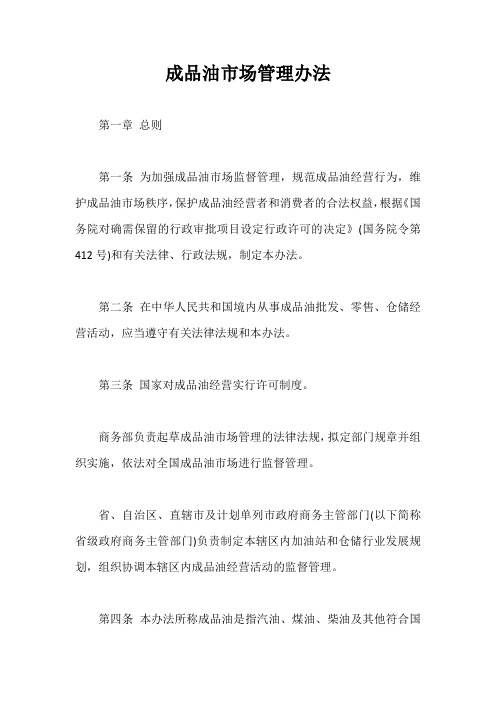
成品油市场管理办法第一章总则第一条为加强成品油市场监督管理,规范成品油经营行为,维护成品油市场秩序,保护成品油经营者和消费者的合法权益,根据《国务院对确需保留的行政审批项目设定行政许可的决定》(国务院令第412号)和有关法律、行政法规,制定本办法。
第二条在中华人民共和国境内从事成品油批发、零售、仓储经营活动,应当遵守有关法律法规和本办法。
第三条国家对成品油经营实行许可制度。
商务部负责起草成品油市场管理的法律法规,拟定部门规章并组织实施,依法对全国成品油市场进行监督管理。
省、自治区、直辖市及计划单列市政府商务主管部门(以下简称省级政府商务主管部门)负责制定本辖区内加油站和仓储行业发展规划,组织协调本辖区内成品油经营活动的监督管理。
第四条本办法所称成品油是指汽油、煤油、柴油及其他符合国家产品质量标准、具有相同用途的乙醇汽油和生物柴油等替代燃料。
第二章申请与受理第五条申请从事成品油批发、仓储经营资格的企业,应当向所在地省级政府商务主管部门提出申请,省级政府商务主管部门审查后,将初步审查意见及申请材料上报商务部,由商务部决定是否给予成品油批发、仓储经营许可。
第六条申请从事成品油零售经营资格的企业,应当向所在地市级(设区的市,下同)政府商务主管部门提出申请。
地市级政府商务主管部门审查后,将初步审查意见及申请材料报省级政府商务主管部门。
由省级政府商务主管部门决定是否给予成品油零售经营许可。
第七条申请成品油批发经营资格的企业,应当具备下列条件:(一)具有长期、稳定的成品油供应渠道:1. 拥有符合国家产业政策、原油一次加工能力100万吨以上、符合国家产品质量标准的汽油和柴油年生产量在50万吨以上的炼油企业,或者2.具有成品油进口经营资格的进口企业,或者3.与具有成品油批发经营资格且成品油年经营量在20万吨以上的企业签订1年以上的与其经营规模相适应的成品油供油协议,或者4.与成品油年进口量在10万吨以上的进口企业签订1年以上的与其经营规模相适应的成品油供油协议;(二)申请主体应具有中国企业法人资格,且注册资本不低于3000万元人民币;(三)申请主体是中国企业法人分支机构的,其法人应具有成品油批发经营资格;(四)拥有库容不低于10000立方米的成品油油库,油库建设符合城乡规划、油库布局规划;并通过国土资源、规划建设、安全监管、公安消防、环境保护、气象、质检等部门的验收;(五)拥有接卸成品油的输送管道或铁路专用线或公路运输车辆或1万吨以上的成品油水运码头等设施。
《成品油市场管理办法》

《成品油市场管理办法》近年来,我国成品油市场管理层面越来越注重,尤其是因为成品油当前的市场管理存在着一些问题,对成品油的供应和销售等基本运行也受到影响,甚至给消费者造成了一定的负面影响。
因此,当前成品油市场管理更需要进一步改进,实现真正有效的管理。
为了解决成品油市场管理问题,现针对成品油市场管理规定《成品油市场管理办法》,依法规范成品油市场的运行秩序,保障成品油供给和销售,保障消费者合法权益,使成品油市场管理更加完善。
一、总则1、为从行业调整、营销管理、价格稳定、市场监督等方面推动成品油市场管理,特制定本办法。
2、本办法适用于全国境内成品油市场。
3、成品油市场管理应遵循保护消费者合法权益的宗旨,维护成品油市场秩序,营造公正公平的市场环境。
二、成品油市场调整1、国家可以根据经济形势及时调整石油市场和消除钝化性行业障碍,改善市场结构,实现经济和社会发展结构调整。
2、成品油市场可以通过引进廉价石油、加强企业后市场服务、推行石油联合体市场等措施进行调整。
三、营销管理1、积极鼓励和支持成品油企业开展市场营销,加强成品油市场营销效果,提高市场竞争力。
2、成品油企业应当组织对市场的调查研究,掌握市场需求状况,合理规划和安排营销结构。
3、营销组织应当按照规定开展经营活动,积极开发市场,加强关系维护,拓展消费者群体,保证和维护消费者和供应商的合法权益。
四、价格稳定1、成品油价格由成品油价格监督管理组织发布价格,并及时向消费者公布。
2、成品油价格变动,应根据经济状况、社会实际情况及消费者需求等因素,经司法机关认定,变动通过各级价格监督管理组织统一发布。
3、成品油价格变动,应当防止出现成品油价格暴涨、报价虚高、同行抬价等行为。
五、监督管理1、各级价格监督管理组织应当加强监督管理,坚持科学价格、公开市场、动态调整、精细管理的原则,加强成品油供应和销售市场的管理。
2、各级价格监督管理组织应当加强消费者权益教育,加强相关政策宣传,使消费者能了解到市场消费权益的有关规定,依法维护自己的合法权益。
成品油市场管理办法

成品油市场管理办法1. 引言成品油是指从原油提取后再经过精炼、加工而成的石油产品。
成品油市场是一个重要的市场,对国民经济的发展起着重要作用。
为了规范和管理成品油市场,保障市场的公平竞争和消费者的权益,制定了《成品油市场管理办法》。
2. 法律适用范围本办法适用于中华人民共和国境内的成品油市场的管理。
3. 成品油市场管理原则本办法遵循以下管理原则:•公平竞争:保障市场参与者的公平竞争权利,禁止垄断和不正当竞争行为。
•价格自由:成品油价格由市场供需关系决定,不得操纵和干预。
•质量安全:确保成品油的质量和安全符合国家标准和法规要求。
•信息公开:加强对成品油市场信息的公开和透明度,提高市场参与者的知情权和选择权。
•保护消费者权益:保护消费者在成品油市场中的合法权益,禁止欺诈、虚假宣传等违法行为。
4. 主要管理措施4.1. 市场准入管理为了保障市场的公平竞争和消费者的权益,对成品油市场的准入进行管理。
凡是符合法律法规要求,具备相应资质和条件的企业,均有权进入成品油市场经营。
同时,建立健全市场退出机制,对不符合条件或存在违法行为的企业进行清退。
4.2. 价格管理成品油价格由市场供需关系决定,不得操纵和干预。
但是,为了维护市场秩序,可以对成品油价格进行合理调控。
各级价格主管部门应当根据市场状况和经济发展需要,及时发布成品油价格信息,为市场参与者提供参考。
4.3. 质量安全管理成品油的质量安全是保障消费者权益的重要方面。
制定相关质量标准和检测方法,对成品油进行质量监管。
对不符合质量标准的成品油,相关部门应当采取相应措施进行处置,并追究相关责任。
4.4. 信息公开管理加强对成品油市场信息的公开和透明度,提高市场参与者的知情权和选择权。
相关部门应当建立完善的成品油市场信息发布制度,及时发布成品油价格、质量、供应等信息,供市场参与者和消费者参考。
4.5. 消费者权益保护管理保护消费者在成品油市场中的合法权益,禁止欺诈、虚假宣传等违法行为。
成品油市场管理办法

成品油市场管理办法成品油市场管理办法一、总则为规范成品油市场的经营行为,维护市场秩序,促进成品油行业的健康发展,根据《中华人民共和国石油管理法》等相关法律法规,制定本管理办法。
二、适用范围本管理办法适用于我国境内涉及成品油生产、销售、储运等环节的各类经营主体。
三、成品油生产3.1 生产资格成品油生产企业须持有合法的企业注册登记证明,具备相应的生产资质,按照国家质量标准进行生产,确保产品质量。
3.2 生产安全成品油生产企业应建立健全生产安全管理制度,落实现场安全管理责任制,确保生产过程中无事故发生。
同时,企业应定期进行生产设备的维护保养和安全检查,确保设备正常运行。
3.3 环境保护成品油生产企业应严格遵守国家环境保护法律法规,配备完善的污染防治设施,对废水、废气、废渣等进行安全处理,减少对环境的影响。
四、成品油销售4.1 销售资格成品油销售企业应具备相应的销售资质,持有合法的企业注册登记证明,并按照国家相关规定进行备案。
4.2 产品标识成品油销售企业应在产品包装上标识明确的产品信息,包括产品种类、产地、规格、批号等,确保消费者了解产品的基本信息。
4.3 价格管理成品油销售价格应遵循市场原则,不得搞垄断行为,不得操纵市场价格。
同时,相关部门可以根据市场情况进行价格监管,维护市场价格秩序。
4.4 质量监管成品油销售企业应严格按照国家质量标准执行,确保产品质量符合国家要求。
相关部门可以对销售企业进行质量抽检,发现问题及时查处,并公布相关信息。
五、成品油储运5.1 储存管理成品油储存企业应按照国家规定的安全标准,建立健全储存管理制度,确保储存设施安全可靠,防止火灾、爆炸等事故发生。
5.2 运输管理成品油运输企业应持有合法的运输资质,专业从事成品油运输工作。
运输过程中,应及时检查车辆状况,确保运输安全稳定。
5.3 应急准备成品油储存和运输企业应制定应急预案,建立应急救援队伍,做好突发事件的应对工作,减少事故损失。
商务部《成品油市场管理办法》
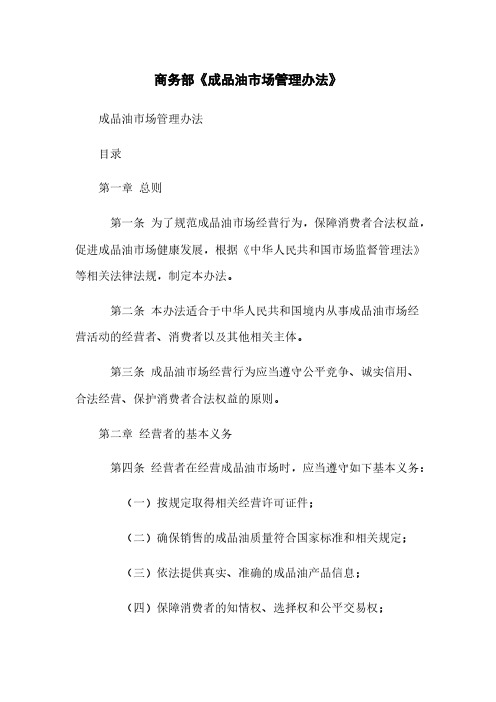
商务部《成品油市场管理办法》成品油市场管理办法目录第一章总则第一条为了规范成品油市场经营行为,保障消费者合法权益,促进成品油市场健康发展,根据《中华人民共和国市场监督管理法》等相关法律法规,制定本办法。
第二条本办法适合于中华人民共和国境内从事成品油市场经营活动的经营者、消费者以及其他相关主体。
第三条成品油市场经营行为应当遵守公平竞争、诚实信用、合法经营、保护消费者合法权益的原则。
第二章经营者的基本义务第四条经营者在经营成品油市场时,应当遵守如下基本义务:(一)按规定取得相关经营许可证件;(二)确保销售的成品油质量符合国家标准和相关规定;(三)依法提供真实、准确的成品油产品信息;(四)保障消费者的知情权、选择权和公平交易权;(五)不得以不正当手段限制竞争,伤害其他经营者合法权益。
第三章成品油市场经营行为规范第五条经营者在成品油市场经营过程中,应当遵循以下规范:(一)不得采取虚假广告、夸大宣传、误导消费者等不正当手段;(二)不得销售劣质成品油或者以次充好;(三)不得擅自提高成品油价格或者以任何形式哄抬价格;(四)不得变相从事经营特许经营的行为;(五)不得偷漏税款,提供虚假的财务报表。
第四章消费者权益保护第六条消费者在成品油市场中享有如下权益:(一)购买符合国家标准和质量保证的成品油产品;(二)获取真实、准确的成品油产品信息;(三)享有公平交易权,不受不正当限制和歧视待遇;(四)依法维权,要求经营者承担相应责任。
第五章监督管理与处罚第七条市场监管部门对成品油市场进行监督管理,采取以下措施:(一)加强成品油市场的日常监督检查;(二)依法查处违法违规行为,并作出相应处罚;(三)建立投诉举报机制,及时处理消费者投诉。
第六章附则第八条本办法自发布之日起施行。
第九条其他涉及成品油市场经营的相关法律法规和规章另有规定的,依照其规定执行。
附件:1. 成品油市场经营许可证申请表2. 成品油产品质量检验标准3. 成品油价格监测报表法律名词及注释:1.《中华人民共和国市场监督管理法》:中华人民共和国国家法律,用于规范各类市场主体的经营行为,保护市场秩序和消费者权益。
成品油市场管理办法
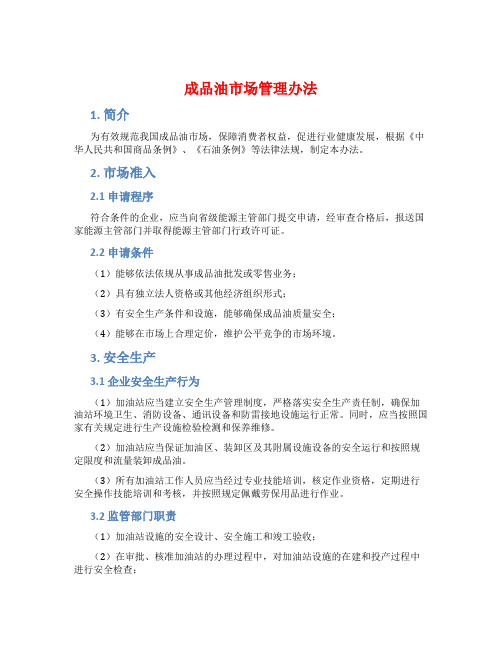
成品油市场管理办法1. 简介为有效规范我国成品油市场,保障消费者权益,促进行业健康发展,根据《中华人民共和国商品条例》、《石油条例》等法律法规,制定本办法。
2. 市场准入2.1 申请程序符合条件的企业,应当向省级能源主管部门提交申请,经审查合格后,报送国家能源主管部门并取得能源主管部门行政许可证。
2.2 申请条件(1)能够依法依规从事成品油批发或零售业务;(2)具有独立法人资格或其他经济组织形式;(3)有安全生产条件和设施,能够确保成品油质量安全;(4)能够在市场上合理定价,维护公平竞争的市场环境。
3. 安全生产3.1 企业安全生产行为(1)加油站应当建立安全生产管理制度,严格落实安全生产责任制,确保加油站环境卫生、消防设备、通讯设备和防雷接地设施运行正常。
同时,应当按照国家有关规定进行生产设施检验检测和保养维修。
(2)加油站应当保证加油区、装卸区及其附属设施设备的安全运行和按照规定限度和流量装卸成品油。
(3)所有加油站工作人员应当经过专业技能培训,核定作业资格,定期进行安全操作技能培训和考核,并按照规定佩戴劳保用品进行作业。
3.2 监管部门职责(1)加油站设施的安全设计、安全施工和竣工验收;(2)在审批、核准加油站的办理过程中,对加油站设施的在建和投产过程中进行安全检查;(3)定期检查加油站环境卫生、设备设施和职工劳动保护情况;(4)批准并监督加油站安全生产应急救援预案;4. 检测和验收4.1 加油站自检加油站应当建立和保持完善的质量检测、维护和验收制度,并对成品油进行定期自检,确保成品油质量达到国家有关规定的要求。
4.2 检测部门监督加油站应当根据规定向质检部门送样检测,质检部门应当对送样加油站进行抽样检验,并对检验结果向加油站提出处理建议。
同时,质检部门应当对加油站质量管理尽职进行监督和检查,确保质量管理体系的实施和有效性。
5. 价格管理5.1 价格形成机制成品油价格应当按照市场供求关系和成本因素自主形成,除市场因素之外不得依据其他因素政府干预。
成品油市场管理方法-英文
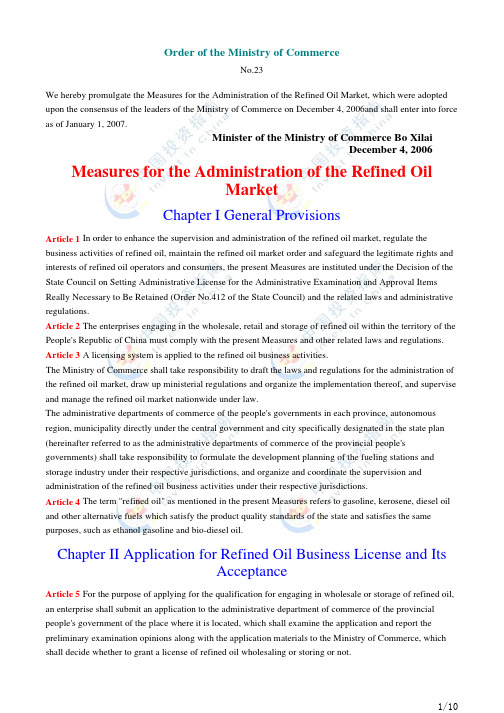
Order of the Ministry of CommerceNo.23We hereby promulgate the Measures for the Administration of the Refined Oil Market, which were adopted upon the consensus of the leaders of the Ministry of Commerce on December 4, 2006and shall enter into force as of January 1, 2007.Minister of the Ministry of Commerce Bo XilaiDecember 4, 2006 Measures for the Administration of the Refined OilMarketChapter I General ProvisionsArticle 1In order to enhance the supervision and administration of the refined oil market, regulate the business activities of refined oil, maintain the refined oil market order and safeguard the legitimate rights and interests of refined oil operators and consumers, the present Measures are instituted under the Decision of the State Council on Setting Administrative License for the Administrative Examination and Approval Items Really Necessary to Be Retained (Order No.412 of the State Council) and the related laws and administrative regulations.Article 2The enterprises engaging in the wholesale, retail and storage of refined oil within the territory of the People's Republic of China must comply with the present Measures and other related laws and regulations. Article 3A licensing system is applied to the refined oil business activities.The Ministry of Commerce shall take responsibility to draft the laws and regulations for the administration of the refined oil market, draw up ministerial regulations and organize the implementation thereof, and supervise and manage the refined oil market nationwide under law.The administrative departments of commerce of the people's governments in each province, autonomous region, municipality directly under the central government and city specifically designated in the state plan (hereinafter referred to as the administrative departments of commerce of the provincial people's governments) shall take responsibility to formulate the development planning of the fueling stations and storage industry under their respective jurisdictions, and organize and coordinate the supervision and administration of the refined oil business activities under their respective jurisdictions.Article 4The term "refined oil" as mentioned in the present Measures refers to gasoline, kerosene, diesel oil and other alternative fuels which satisfy the product quality standards of the state and satisfies the same purposes, such as ethanol gasoline and bio-diesel oil.Chapter II Application for Refined Oil Business License and ItsAcceptanceArticle 5For the purpose of applying for the qualification for engaging in wholesale or storage of refined oil, an enterprise shall submit an application to the administrative department of commerce of the provincial people's government of the place where it is located, which shall examine the application and report the preliminary examination opinions along with the application materials to the Ministry of Commerce, which shall decide whether to grant a license of refined oil wholesaling or storing or not.Article 6To apply for the qualification for engaging in the retail business of refined oil, an enterprise shall submit an application to the administrative department of commerce of the municipal people's government (or the level of districted city, same below) of the place where it is located, which shall examine the application and report the preliminary examination opinion along with the application materials to the administrative department of commerce of the provincial people's government, which shall determine whether to grant a refined oil retailing license or not.Article 7To apply for the qualification for engaging in wholesale business of refined oil, an enterprise shall satisfy the conditions as follows:(1)it must have secular and stable channels to provide refined oil;(a)it must have an oil refining enterprise which observes the industrial policies of the state, is capable of processing crude oil of at least 1 million tons at one time, and whose annual productive capacity of gasoline and diesel oil which observe the product quality standards of the state is at least 500,000 tons, or(b)it must be an import enterprise which has acquired the qualification for refined oil import, or(c)it has signed with an enterprise which has acquired the qualification for refined oil wholesale and whose annual business volume of refined oil is at least 200,000 tons a refined oil supply agreement for at least one year , which shall be consistent with its business scale, or(d)it has signed with an import enterprise whose annual import volume of refined oil is at least 100,000 tonsa refined oil supply agreement for at least one year, which shall be in line with its business scale;(2)the applicant must be a qualified Chinese enterprise legal person with a registered capital of at least 30 million Yuan;(3)where the applicant is a branch of a Chinese enterprise legal person, its legal person must have the qualification for engaging in the wholesale of refined oil;(4)it must have a refined oil depot whose capacity shall be larger than 10,000 steres and whose construction shall abide by the local urban and rural planning and oil depot layout planning; the related departments in charge of state land and resources, planning and construction, safety and supervision, public security and fire-fighting, environmental protection, meteorology and quality inspection, etc. shall have checked and accepted the depot ;(5)it must be equipped with such facilities to unload refined oil as conduit pipes, railway special lines, highway transport vehicles or the ports for transporting refined oil over water whose capacity shall be larger than 10,000 tons.Article 8To apply for the qualification for engaging in the retailing business of refined oil, an enterprise shall satisfy the conditions as follows:(1)it must abide by the local development planning for the fueling station industry and the technical specifications and requirements;(2)it must have secular and stable channels to supply refined oil, and have signed with an enterprise has acquired the qualification to engage in the wholesale business of refined oil a refined oil supply agreement for at least three years, which shall be in line with its business scale;(3)the design and construction of the fueling station must abide by the related standards of the state and have been checked and accepted by the related departments responsible for state land and resources, planning and construction, safety and supervision, public security and fire-fighting, environmental protection, meteorology and quality inspection, etc;(4)it must have professional and technical personnel with regards to the inspection, metrology, storage andfire-fighting and safe production of refined oil;(5)the marine fueling stations (vessels) and land-based fueling stations (sites) for the supply of refined oil used for vessels must observe, in addition to the above-mentioned provisions, the related provisions on ports, water transportation safety and prevention and control of water pollution, etc; and(6)as regards the fueling stations built in rural areas and only sell diesel oil, the administrative departments of commerce of the provincial people's governments shall institute specific conditions for their establishment under the present Measures.Article 9To apply for the qualification for engaging in the storage business of refined oil, an enterprise shall satisfy the conditions as follows:(1)it shall have a refined oil depot whose capacity shall be larger than 10,000 steres and whose construction shall abide by the local urban and rural planning and oil depot layout planning; the related departments in charge of state land and resources, planning and construction, safety and supervision, public security and fire-fighting, environmental protection, meteorology and quality inspection, etc shall have checked and accepted the depot ;(2)the applicant must be a qualified Chinese enterprise legal person with a registered capital of at least10 million Yuan;(3)it must be equipped with such facilities to unload refined oil as conduit pipes, railway special lines, highway transport vehicles or ports for transporting refined oil over water whose capacity shall be larger than 10,000 tons; and(4)where the applicant is a branch of a Chinese enterprise legal person, its legal person must be qualified to engage in the storage of refined oil;Article 10To set up a foreign-funded refined oil enterprise, the present Measures, the related state policies and the provisions in the laws and regulations concerning foreign investment shall be observed.If the same foreign investor engaging in the retailing of refined oil within the territory of China has at least 30 fueling stations (including those set up with its investment, those in which it has a holding share and those it has rented), or if the same foreign investor sells different varieties and brands of refined oil from more than one supplier, the foreign party may not hold a controlling share.Article 11To apply for the qualification for engaging in the refined oil business, an enterprise must submit the following documents:(1)an application;(2)a property right certificate of its oil depot, fueling stations (sites) and the supporting facilities; the approval certificates and acceptance documents on oil depot, fueling stations (sites) and other facilities released by the departments responsible for state land and resources, planning and construction, safety supervision, public security and fire-fighting, environmental protection, meteorology and quality inspection, etc;(3)Business License for Enterprise Legal Person or Circular for Advance Approval of Enterprise Name as released by the department of industry and commerce;(4)Hazardous Chemical Business License as released by the department of safety supervision;(5)Approval Certificate of Foreign-funded Enterprise of the People's Republic of China as regards a foreign-funded enterprise;(6)Other documents required by the examination and verification organs.Article 12An enterprise which applies for the qualification for engaging in the wholesale business of refined oil shall, provide the legal instruments and the related materials on its secular and stable supply of refined oilin addition to the documents as provided in Article 11 of the present Measures.Article 13An enterprise which applies for the qualification for engaging in the retailing business of refined oil shall, in addition to the documents as provided in Article 11 of the present Measures, provide the legal instruments and the related materials concerning its secular and stable supply of refined oil and the confirmation concerning fueling station (site) planning as released by the administrative department of commerce of the provincial people's government.If an enterprise acquires the land use right of its fueling station (site) through bidding, auction or listing, it shall also provide the advance approval documents concerning approving the applicant to take part in the bidding or auction as released by the administrative department of commerce of the provincial people's government and the Sales Confirmation of the auction (bidding, listing) of state-owned land use right as released by the department of state land and resources.With regard to a marine fueling station (vessel), it is also necessary to provide the Opinion concerning Examining the Operating Conditions of Fueling Vessels as signed by the water area supervision department. Article 14An enterprise which applies for the qualification for engaging in the storage business of refined oil shall also provide the confirmation document concerning oil depot planning as released by the administrative department of commerce of the provincial people's government in addition to the documents as provided in Article 11 of the present Measures.If an enterprise has acquired the land use right of its oil depot through bidding, auction or listing, it shall also provide the advance approval documents concerning approving the applicant to take part in the bidding or auction as released by the administrative department of commerce of the provincial people's government and the Sales Confirmation of the auction (bidding, listing) of state-owned land use right as released by the department of state land and resources.Article 15The administrative department of commerce shall, at its work place, publicize the conditions, procedures, time limit, list of the materials to be submitted and model application letter for applying for refined oil business license.Article 16If an administrative department of commerce of the provincial people's government which accepts an application deems that the application materials are not complete or fail to be in line with the related provisions, it shall notify, once and for all, the applicant of all the content which needs to be supplemented or corrected within 5 workdays since receiving the application. If it fails to notify the applicant when the time limit expires, the application shall be deemed as having been accepted since the date when the application materials are received.Article 17If the application materials are complete and accord with the stipulated form, or if the applicant has supplemented or corrected all the application materials as required, the administrative department of commerce of the provincial people's government shall accept the application for refined oil business license.If an administrative department of commerce of the provincial people's government accepts an application for refined oil business license, it shall issue a written certificate which bears the special seal of this administrative organ and indicates the date.If it rejects an application for refined oil business license, it shall issue a written certificate which bears the special seal of this administrative organ, specifies the reasons for rejection and indicates the date, and shall also inform the applicant of the right to apply for administrative reconsideration or to initiate an administrative lawsuit.Article 18The administrative department of commerce of the provincial people's government which acceptsan application shall seriously examine the materials submitted by the applicant and put forward its opinions. Its preliminary examination opinion and the application materials shall, when necessary, be reported to the administrative department of commerce of the higher level for examination and approval by it.Chapter III Procedures and Time Limit of the Examination ofRefined Oil Business LicenseArticle 19An administrative department of commerce of the provincial people's government shall finish the examination and report the preliminary examination opinion and application materials to the Ministry of Commerce within 20 workdays since the receipt of the application for wholesaling or storing refined oil as submitted by an applicant.The Ministry of Commerce shall, within 20 workdays since receiving the application materials as reported by an administrative department of commerce of the provincial people's government, finish the examination and verification. If the application meets the conditions as provided in Article 7 of the present Measures, it shall grant a license for the wholesale of refined oil and release an Approval Certificate for the Wholesale of Refined Oil; if the application meets the conditions as provided in Article 9 of the present Measures, it shall grant a license for the storage of refined oil and release an Approval Certificate for the Storage of Refined Oil; if the application fails to meet the related conditions, it shall inform the applicant of the decision of disapproval and the reasons therefor in written form.Article 20An administrative department of commerce of the municipal people's government shall complete the examination and report its preliminary examination opinions along with the application materials to the administrative department of commerce of the provincial people's government within 20 workdays since the receipt of the application for the qualification for engaging in the retailing business of refined oil.The administrative department of commerce of the provincial people's government shall finish the examination within 20 workdays since the receipt of the materials as reported by the administrative department of commerce of the municipal people's government. If the application meets the conditions as provided in Article 8 of the present Measures, it shall grant a license for the retail of refined oil and release an Approval Certificate for the Retail of Refined Oil; if the application fails to meet the related conditions, it shall inform the applicant of the decision of disapproval and the reasons therefor in written form.Article 21If a refined oil wholesaling or storing enterprise newly builds, rebuilds or expands its oil depot or other storage facilities, it shall abide by the urban and rural planning and oil depot layout planning, and report to the Ministry of Commerce for record after acquiring the confirmation document concerning oil depot planning from the administrative department of commerce of the provincial people's government and going through the acceptance procedures at the related departments.If a refined oil retailing enterprise newly builds, rebuilds or expands its fueling station (site) or other facilities, it shall abide by the urban and rural planning and development planning of fueling station industry, and report to the administrative department of commerce of the provincial people's government for record after acquiring the confirmation document concerning fueling station (site) planning from the administrative department of commerce of the provincial people's government and going through the acceptance procedures at the related d departments.Article 22If a business operating entity of a newly-built fueling station is determined byways of the bidding, auction or listing of state-owned land use right, the tenderee or the auction entrusting party shall organize the bidding or auction after acquiring the confirmation document concerning the planning of the subject matter tobe bid or auctioned by the administrative department of commerce of the provincial people's government of the place where it is located; a bidder may only take part in the bidding or auction after acquiring the consent and advance approval document from the administrative department of commerce of the provincial people's government.Article 23If the establishment of a foreign-funded enterprise or enlarging of its business scope, or the M&A of domestic enterprise by a foreign businessman engaging in any refined oil business, it is necessary to send an application to the administrative department of commerce of the provincial people's government, which shall accomplish the examination within one month since the date receiving a complete set of application materials and shall report its preliminary examination opinions and the application materials to the Ministry of Commerce, which shall make a decision concerning whether to approve it or not within three months since the date of receiving all application documents.A foreign-funded enterprise may apply for refined oil business license according to the related provisions of Measures after its establishment, merger or enlargement of business scope is approved by the Ministry of Commerce.Article 24The administrative departments of commerce of the provincial people's government shall report the reply documents concerning refined oil retailing enterprises to the Ministry of Commerce for record within 10 workdays, and simultaneously put the basic information of the refined oil retailing enterprises into the enterprise database of refined oil market management information system.Article 25With regard to an application for refined oil business license, if the administrative department of commerce which accepts the application believes it necessary to hold a hearing, it shall make public announcement to the society and hold a hearing.Article 26If a refined oil enterprise intends to set up a branch which engages in the refined oil business, it shall go through the application procedures separately according to the provisions of the present Measures.Chapter IV Issuance and Change of the Approval Certificate forRefined Oil BusinessArticle 27The Approval Certificate for refined oil business shall be exclusively printed by the Ministry of Commerce. The Approval Certificate for the Wholesale of Refined Oil and the Approval Certificate for the Storage of Refined Oil shall be released by the Ministry of Commerce. The Approval Certificate for the Retail of Refined Oil shall be released by the administrative departments of commerce of the provincial people's governments.Article 28Where a refined oil wholesaling or storing enterprise intends to change any item of the Approval Certificate for the Wholesale of Refined Oil or the Approval Certificate for the Storage of Refined Oil, it shall send an application to the administrative department of commerce of the provincial people's government, which shall, if finding it qualified through preliminary examination, report it to the Ministry of Commerce for examination and approval. If it meets the conditions to continue engaging in the refined oil business, the Ministry of Commerce shall release a new Approval Certificate for the Wholesale of Refined Oil or Approval Certificate for the Storage of Refined Oil.If a refined oil retailing enterprise intends to modify any item of the Approval Certificate for the Retail of Refined Oil, it shall send an application to the administrative department of commerce of the municipal people's government, which shall, if finding it qualified through preliminary examination, report it to the administrative department of commerce of the provincial people's government for examination and approval.If it meets the conditions to continue engaging in refined oil business, the administrative department of commerce of the provincial people's government shall release a new Approval Certificate for the Retail of Refined Oil.Article 29If a refined oil enterprise intends to modify any item of the Approval Certificate for the refined oil business, it shall submit the documents to the application department as follows:Under the premise that the investor of the business entity remain unchanged, and only the enterprise name is changed, the enterprise shall provide the Circular for Advance Approval of Enterprise Name as released by the administrative department for industry and commerce or the certificate concerning the change of vessel name as released by the administrative department of ship's nationality; the employment certificate and the identity certificate of the new legal representative shall be provided if the legal representative is changed; the certificate on the legal use right of the business place shall be provided if business place which involves no movement of oil depot or fueling station is changed.If the investor of the business entity changes, the original business entity shall implement the related procedures for deregistering its business qualification, while the new business entity shall apply for the qualification for engaging in refined oil business over again.Chapter V Supervision and AdministrationArticle 30The administrative departments of commerce of the people's governments of each level shall intensify their supervision and inspection of the refined oil market under their respective jurisdictions and investigate and punish the violations conducted by refined oil enterprises.Article 31The administrative departments of commerce of the provincial people's governments shall, according to the present Measures, organize the inspection concerning the enterprises which have the qualification for engaging in the refined oil business every year and report the inspection results to the Ministry of Commerce.As regards a refined oil enterprise which is found to be unqualified in the annual inspection, the Ministry of Commerce and the administrative department of commerce of the provincial people's government shall order it to rectify within a certain time limit; if it is still unqualified after rectification, its qualification for engaging in the refined oil business shall be revoked by the license-issuing authority.Article 32The major content of the annual inspection concerning a refined oil enterprise is as follows:(1)the conclusion and implementation of refined oil supply agreements;(2)the operation of refined oil by the enterprise in the previous year;(3)whether the refined oil enterprise and its supporting facilities comply with the present Measures and the related technical specifications and requirements;(4)the situation of the enterprise in respect of quality, measurement, fire-fighting, security and environmental protection, etc.Article 33A refined oil enterprise which is to suspend or stop its business shall go through the suspension or cancellation procedures with the license-issuing authority. A refined oil wholesaling or storing enterprise may not suspend or stop its business for more than 18 months, while a refined oil retailing enterprise may not suspend or stop its business for more than 6 months. As regards an enterprise which fails to go through the suspension or cancellation procedures without reason by exceeding the stipulated time limit, the license-issuing authority shall revoke its refined oil business license, cancel the Approval Certificate for Refined Oil Business and notify the related departments.Upon approval of the administrative department of commerce of the provincial people's government of the place where it is located, a refined oil retailing enterprise which is to be relocated because of the adjustment of urban planning, road widening or any other reason may appropriately extend its suspending period.Article 34The administrative departments of commerce of the people's governments of each level shall supervise and manage the refined oil business license and the refined oil market without collecting any fee. Article 35The Ministry of Commerce and the administrative departments of commerce of the provincial people's governments shall publicize the list of the enterprises which have acquired a refined oil business license and the information concerning the change or cancellation of any enterprise.Article 36The Approval Certificate for refined oil business may not be forged, modified, traded, leased, lent or transferred in any other form.An modified or cancelled Approval Certificate for refined oil business shall be surrendered to the license-issuing authority, any other entity or individual must not remain it privately.Article 37The special refined oil for special users shall be utilized according to the provisions of the state on the quantity, purpose and scope of supply, and may not be sold to any other irrelevant person.Article 38A refined oil enterprise shall operate under law. Any of the following acts is forbidden:(1)engaging in business without a certificate or license or with a certificate and license which are not in line with each other or beyond its authorized business scope;(2)failing to use a fueling machine or any other measuring instrument or failing to use a tax-control device as required by any of its fueling station;(3)using any fueling machine which has not been tested or exceeded the term of test or which does not satisfy the requirements for explosion prevention and protection, or modifying the fueling machine without authorization or skimping oil by other ways;(4)mixing impurities or imitations, passing a fake product as a genuine one or passing a defective product asa high-quality one;(5)selling the refined oil which has been phased out as expressly ordered by the state or whose quality is incompetent;(6)trading smuggled or illegally refined oil;(7)driving up oil prices or dumping oil at a low price by going against the laws and regulations concerning price;(8)other business activities as forbidden by any law or regulation of the state.Article 39A refined oil retailing enterprise shall purchase refined oil from the enterprises which have the qualification for engaging in the wholesale business of refined oil.Any refined oil retailing enterprise may not sell refined oil on a commission basis for any enterprise without the qualification for engaging in the wholesale business of refined oil.If a refined oil storing enterprise stores refined oil for any other entity, it shall verify the legality of the source of the refined oil and the legality of the certificate of its client.Any refined oil wholesaling enterprise may not sell any refined oil used for business purpose to any enterprise without the qualification for engaging in refined oil business.Article 40If any of the following circumstances occurs, the administrative department of commerce which made a decision to grant a refined oil business license or the administrative department of commerce at the next higher level may, at the request of the interested person or by virtue of its own power, annul the said decision:。
成品油市场管理办法

成品油市场管理办法成品油市场管理办法第一章总则第一条为规范成品油市场经营秩序,促进成品油供应保障,保护消费者合法权益,维护国家经济安全和社会稳定,制定本办法。
第二条本办法适用于从事成品油生产、销售等经营活动的市场主体。
第三条成品油市场经营应遵循公平竞争、诚实守信的原则,不得从事虚假宣传、价格垄断、串通欺诈等违法违规行为。
第四条国家对成品油市场经营实行事前许可制度,市场主体依法取得成品油经营许可方可开展经营活动。
第五条国家对成品油出厂、运输、储存等环节实施监管,确保成品油质量安全。
第六条国家鼓励和支持发展替代能源,促进能源结构调整,提高能源利用效率。
第二章成品油生产和销售第七条成品油生产企业应取得石油加工业务许可证,按照国家质量标准生产成品油,确保产品质量和安全。
成品油生产企业应当建立健全质量管理体系,加强质量监控和检测。
第八条成品油销售企业应取得石油产品批发零售许可证,明码标价,公开销售信息。
销售企业应当建立健全销售管理制度,确保油品来源可追溯。
第九条成品油销售企业应当按照国家相关要求,开展合规经营,保障消费者合法权益。
销售企业不得进行虚假宣传,不得进行价格欺诈行为。
第十条成品油销售企业应当合理安排供应,保障市场需求。
不得擅自限制供应,不得哄抬价格。
第三章成品油价格管理第十一条国家对成品油价格实行政府指导价和市场调节价相结合的机制。
成品油价格由国家发展改革委员会依据市场行情和相关政策进行定价。
第十二条成品油价格调整应当公开透明,合理公正。
国家发展改革委员会应当及时发布价格调整方案和依据,向社会公众公开。
第十三条成品油价格调整方案实施后,销售企业应当及时调整销售价格,不得擅自提高价格,不得抢占市场。
第十四条国家发展改革委员会可以根据市场情况和能源政策进行成品油价格干预,合理调控市场价格。
第四章成品油市场监管第十五条国家对成品油市场进行监管,加强对市场主体和产品的监督检查。
对发现违法违规行为的,应及时依法采取行政处罚措施。
成品油市场管理办法

成品油市场管理办法
成品油市场管理办法
一、总则
成品油市场管理办法是为规范和管理成品油市场秩序,维护市场公平竞争环境,保障消费者利益而制定的。
本办法适用于成品油市场销售、经营等活动的管理。
二、成品油市场准入
1. 企业资质
凡有销售成品油资质的企业,需具备相关证书和资质方可进入成品油市场从事销售活动。
2. 标准要求
销售的成品油必须符合国家相关标准,不得偷工减料或伪冒伪劣产品。
3. 安全要求
销售成品油必须符合相关安全要求,保障消费者的生命财产安全。
三、成品油市场行为规范
1. 价格合理
企业在销售成品油时,应当遵循市场价格,不得操纵价格,保持价格合理稳定。
2. 营销行为
销售企业不得采取虚假宣传、欺骗消费者等不正当手段,维护市场诚信。
3. 服务规范
销售企业应提供良好的售后服务,保障消费者权益。
四、监督管理
1. 主管部门
相关主管部门应对成品油市场进行定期监督检查,加强对销售企业的监管。
2. 投诉处理
消费者如对成品油销售行为有异议,可以向相关部门进行投诉举报,由主管部门进行处理。
3. 处罚机制
对于违法违规行为,主管部门有权对销售企业进行处罚,直至吊销销售资质。
五、附则
本办法自发布之日起施行,如有变动,须经相关部门批准。
为确保成品油市场的稳定和健康发展,所有相关企业应切实落实本办法的要求。
以上是关于成品油市场管理办法的主要内容,希望能够有效规范和管理成品油市场,维护市场秩序和消费者权益。
成品油市场管理办法
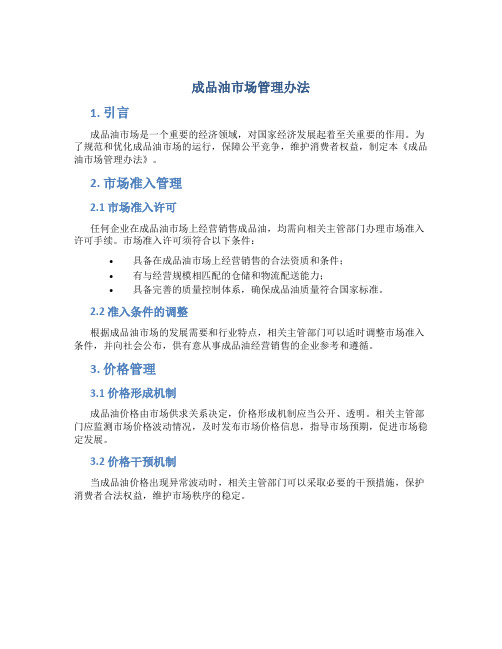
成品油市场管理办法1. 引言成品油市场是一个重要的经济领域,对国家经济发展起着至关重要的作用。
为了规范和优化成品油市场的运行,保障公平竞争,维护消费者权益,制定本《成品油市场管理办法》。
2. 市场准入管理2.1 市场准入许可任何企业在成品油市场上经营销售成品油,均需向相关主管部门办理市场准入许可手续。
市场准入许可须符合以下条件:•具备在成品油市场上经营销售的合法资质和条件;•有与经营规模相匹配的仓储和物流配送能力;•具备完善的质量控制体系,确保成品油质量符合国家标准。
2.2 准入条件的调整根据成品油市场的发展需要和行业特点,相关主管部门可以适时调整市场准入条件,并向社会公布,供有意从事成品油经营销售的企业参考和遵循。
3. 价格管理3.1 价格形成机制成品油价格由市场供求关系决定,价格形成机制应当公开、透明。
相关主管部门应监测市场价格波动情况,及时发布市场价格信息,指导市场预期,促进市场稳定发展。
3.2 价格干预机制当成品油价格出现异常波动时,相关主管部门可以采取必要的干预措施,保护消费者合法权益,维护市场秩序的稳定。
4. 质量监管4.1 质量检验成品油生产企业和销售企业应当按照国家质量标准,对成品油进行必要的质量检验。
相关主管部门可以对企业进行定期或不定期的抽样检查,确保成品油质量符合国家标准。
4.2 不合格产品处理对于发现质量不合格的成品油,相关企业应当主动采取措施停止销售,并配合相关主管部门进行调查处理。
对于严重违反质量标准的企业,相关主管部门可以采取责令停产停业、罚款等措施,保障消费者权益。
5. 行业协会的作用成品油市场的管理离不开行业协会的积极参与和支持。
相关主管部门应当加强与行业协会的沟通合作,充分发挥行业协会的作用,推动成品油市场的健康有序发展。
6. 法律责任对于违反成品油市场管理办法的行为,相关主管部门可以依法给予警告、罚款、吊销许可证等行政处罚,并可追究法律责任。
7. 结束语本《成品油市场管理办法》的出台,将有助于规范市场秩序,促进成品油市场的健康发展,保护消费者合法权益,推动国家经济的繁荣和稳定。
成品油市场管理办法
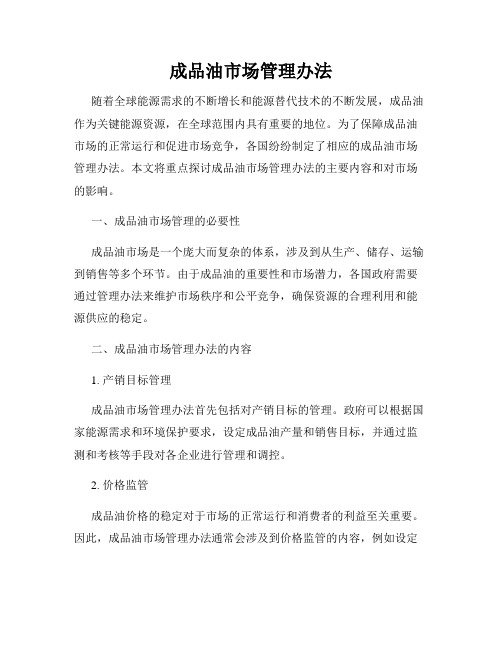
成品油市场管理办法随着全球能源需求的不断增长和能源替代技术的不断发展,成品油作为关键能源资源,在全球范围内具有重要的地位。
为了保障成品油市场的正常运行和促进市场竞争,各国纷纷制定了相应的成品油市场管理办法。
本文将重点探讨成品油市场管理办法的主要内容和对市场的影响。
一、成品油市场管理的必要性成品油市场是一个庞大而复杂的体系,涉及到从生产、储存、运输到销售等多个环节。
由于成品油的重要性和市场潜力,各国政府需要通过管理办法来维护市场秩序和公平竞争,确保资源的合理利用和能源供应的稳定。
二、成品油市场管理办法的内容1. 产销目标管理成品油市场管理办法首先包括对产销目标的管理。
政府可以根据国家能源需求和环境保护要求,设定成品油产量和销售目标,并通过监测和考核等手段对各企业进行管理和调控。
2. 价格监管成品油价格的稳定对于市场的正常运行和消费者的利益至关重要。
因此,成品油市场管理办法通常会涉及到价格监管的内容,例如设定价格上限或下限,以限制价格的过度波动或恶性竞争,维护市场价格的合理水平。
3. 市场准入管理为了保证市场公平竞争和防止垄断行为,成品油市场管理办法通常会对市场准入进行管理。
政府可以要求企业遵守相关法规和标准,进行审批和监管,以确保市场的多元化和竞争性。
4. 安全生产管理成品油是一种易燃易爆的化学物质,安全生产对于保障员工和社会大众的生命财产安全至关重要。
因此,成品油市场管理办法通常会包含对安全生产的要求和管理措施,企业需要建立符合安全标准的生产设施,并定期进行安全评估和监督检查。
三、成品油市场管理办法对市场的影响成品油市场管理办法对市场有着重要的影响,包括以下几个方面:1. 稳定市场价格通过价格监管等措施,成品油市场管理办法可以稳定市场价格,防止价格的过度波动和恶性竞争,保护消费者的利益。
2. 促进市场竞争成品油市场管理办法通过市场准入管理和反垄断措施,可以保护市场的多元化和竞争性,防止垄断行为的发生,促进市场竞争和创新。
成品油市场管理办法全文

成品油市场管理办法全文成品油市场管理办法全文第一章总则第一条 为规范成品油市场秩序,保障消费者权益,促进成品油市场健康发展,根据《中华人民共和国油气管道法》、《中华人民共和国价格法》等相关法律法规,制定本办法。
第二条 本办法适合于中华人民共和国境内成品油的生产、流通、销售等活动,以及与成品油市场管理相关的行为。
第二章成品油市场准入和退出管理第三条 成品油生产、流通、销售企业应依法经营,取得相应的许可证、证书,并按照像关法规和标准进行生产和销售。
第四条 企业应当根据市场需求和供应能力进行生产和经营,严禁无序投产、降低产品质量以及虚构销售。
第五条 成品油生产企业应当建立健全产品质量检测体系,确保产品质量稳定可靠。
第六条 成品油企业应当按照国家的规定和标准进行销售,不得从事搀假、夹杂、混充等违法行为。
第七条 依法办理退出手续的成品油企业应当按照法律法规的规定进行清算并进行相应的公告,保护消费者和法人等权益。
第三章成品油价格管理第八条 成品油价格由市场供求关系决定,但价格形成应当遵循公平、公正、公开的原则。
第九条 成品油价格应当根据市场价格、成本、税费等因素综合确定。
第十条 成品油销售企业应当按照国家有关规定报备价格,并在显著位置公示销售价格,保证消费者充分知情。
第十一条 成品油价格调整应当依照法定程序进行,遵循公平、公正、公开原则,保障市场主体合法权益。
第十二条 违反成品油价格管理规定的,应当依照像关法律法规进行处罚。
第四章成品油市场监管第十三条 成品油市场监管应加强对生产企业、流通企业的日常监督检查,发现问题及时处理并依法处罚。
第十四条 成品油市场监管机构有权对生产企业、流通企业的相关记录和资料进行调查核查。
第十五条 成品油市场监管机构应加强对成品油产品质量检验的监督,确保产品质量符合国家标准和法律法规的要求。
第十六条 成品油市场监管机构应建立投诉受理制度,及时处理消费者的投诉和举报。
第十七条 成品油市场监管机构应定期发布成品油市场现状和监管情况,促进市场透明和公平竞争。
成品油市场管理办法
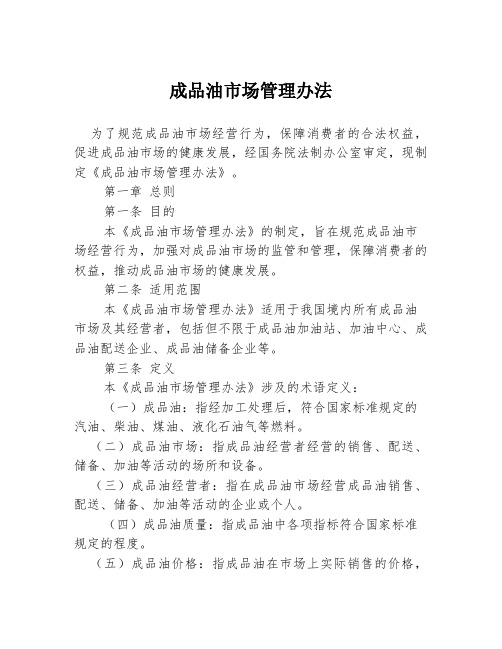
成品油市场管理办法为了规范成品油市场经营行为,保障消费者的合法权益,促进成品油市场的健康发展,经国务院法制办公室审定,现制定《成品油市场管理办法》。
第一章总则第一条目的本《成品油市场管理办法》的制定,旨在规范成品油市场经营行为,加强对成品油市场的监管和管理,保障消费者的权益,推动成品油市场的健康发展。
第二条适用范围本《成品油市场管理办法》适用于我国境内所有成品油市场及其经营者,包括但不限于成品油加油站、加油中心、成品油配送企业、成品油储备企业等。
第三条定义本《成品油市场管理办法》涉及的术语定义:(一)成品油:指经加工处理后,符合国家标准规定的汽油、柴油、煤油、液化石油气等燃料。
(二)成品油市场:指成品油经营者经营的销售、配送、储备、加油等活动的场所和设备。
(三)成品油经营者:指在成品油市场经营成品油销售、配送、储备、加油等活动的企业或个人。
(四)成品油质量:指成品油中各项指标符合国家标准规定的程度。
(五)成品油价格:指成品油在市场上实际销售的价格,包括零售价、批发价、成交价等。
第四条保障原则本《成品油市场管理办法》的保障原则是依法经营、诚信经营、公平竞争、保障消费者的合法权益。
第五条监管机构成品油市场的监管机构为国家质量监督检验检疫总局、中国石油天然气集团公司、中国石化集团公司等相关监管机构。
第二章成品油市场经营第六条市场准入在成品油市场经营的企业或个人,应当具备相应的技术和财力条件,同时符合国有资产、城市规划、土地使用等相关法律法规规定的条件,方可经营成品油市场。
第七条销售准则成品油销售应当符合国家质量标准规定,不存在不合格产品的销售行为。
成品油销售场所应当设置合理,便于消费者加油、观察油量等操作。
第八条价格管理成品油价格应当按照国家有关规定进行管理,遵守市场经济的基本规律,依据市场供求关系、成品油质量等因素确定。
成品油价格需要定期公布,并且应当及时更新。
第九条品质监管成品油市场经营者应当按照国家有关标准规范成品油的质量保证,确保成品油的质量符合国家标准。
成品油市场管理办法全文成品油管理办法
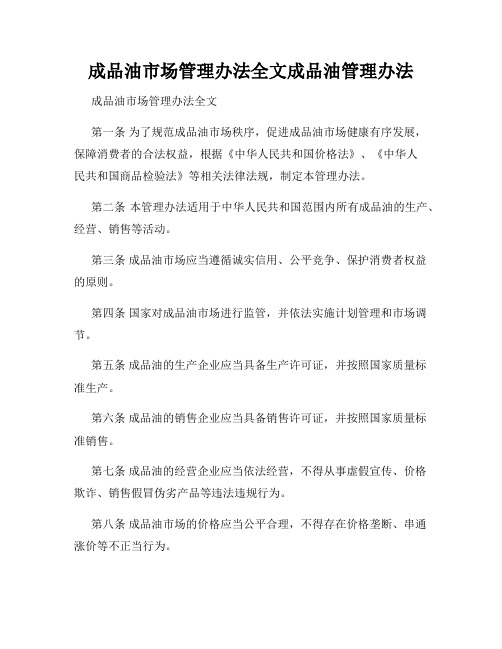
成品油市场管理办法全文成品油管理办法
成品油市场管理办法全文
第一条为了规范成品油市场秩序,促进成品油市场健康有序发展,保障消费者的合法权益,根据《中华人民共和国价格法》、《中华人
民共和国商品检验法》等相关法律法规,制定本管理办法。
第二条本管理办法适用于中华人民共和国范围内所有成品油的生产、经营、销售等活动。
第三条成品油市场应当遵循诚实信用、公平竞争、保护消费者权益的原则。
第四条国家对成品油市场进行监管,并依法实施计划管理和市场调节。
第五条成品油的生产企业应当具备生产许可证,并按照国家质量标准生产。
第六条成品油的销售企业应当具备销售许可证,并按照国家质量标准销售。
第七条成品油的经营企业应当依法经营,不得从事虚假宣传、价格欺诈、销售假冒伪劣产品等违法违规行为。
第八条成品油市场的价格应当公平合理,不得存在价格垄断、串通涨价等不正当行为。
第九条成品油的销售行为应当真实记录销售数量、销售价格等相关信息,不得炒作、谋取不当利益。
第十条成品油市场经营者应当配备专业人员,提供咨询、技术支持等服务,保障消费者的合法权益。
第十一条对于违反本管理办法的行为,相关部门将依法进行处罚,对严重违法行为将采取封停、吊销许可证等措施,直至追究刑事责任。
第十二条本管理办法自公布之日起施行。
附则
本管理办法所称的成品油包括汽油、柴油、润滑油等各类石油产品。
本管理办法的具体实施办法由市场监管部门制定并公布。
本管理办法没有规定的,可参照相关法律法规进行解决。
成品油市场管理办法全文
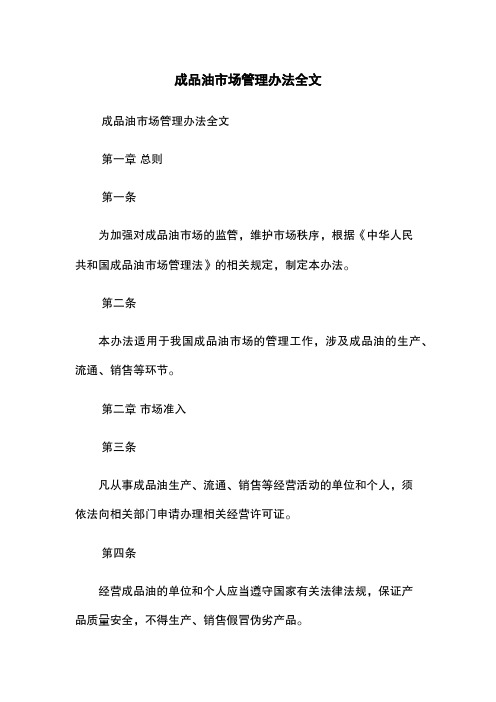
成品油市场管理办法全文
成品油市场管理办法全文
第一章总则
第一条
为加强对成品油市场的监管,维护市场秩序,根据《中华人民
共和国成品油市场管理法》的相关规定,制定本办法。
第二条
本办法适用于我国成品油市场的管理工作,涉及成品油的生产、流通、销售等环节。
第二章市场准入
第三条
凡从事成品油生产、流通、销售等经营活动的单位和个人,须
依法向相关部门申请办理相关经营许可证。
第四条
经营成品油的单位和个人应当遵守国家有关法律法规,保证产
品质量安全,不得生产、销售假冒伪劣产品。
第三章价格管理
第五条
成品油价格由市场供求关系决定,但政府有权根据情况适时进行干预,以维护市场秩序。
第六条
成品油价格的调整应当公开透明,合法合理,不得损害消费者的利益。
第四章监督管理
第七条
市场监督部门对成品油市场的经营主体进行定期检查,确保其经营行为合法合规。
第八条
对于违反成品油市场管理法规的单位和个人,相关部门有权依法进行处理,并可能吊销其经营许可证。
第五章其他
第九条
对于突发的成品油市场情况,相关部门应当及时处理,维护市场稳定。
第十条
本办法自公布之日起正式实施,如有需要,可根据实际情况进行调整。
结语
本文档旨在加强对成品油市场的管理,维护市场秩序,促进行业健康发展,希望广大经营者和消费者共同遵守相关规定,共同维护成品油市场的良好环境。
成品油市场管理办法

成品油市场管理办法【发文字号】中华人民共和国商务部令2006年第23号【发布部门】商务部【公布日期】2006.12.04【实施日期】2007.01.01【时效性】失效【效力级别】部门规章中华人民共和国商务部令(2006年第23号)《成品油市场管理办法》已于2006年11月16日经中华人民共和国商务部第九次部务会讨论通过,现予以公布,自2007年1月1日起施行。
部长:***二○○六年十二月四日成品油市场管理办法第一章总则第一条为加强成品油市场监督管理,规范成品油经营行为,维护成品油市场秩序,保护成品油经营者和消费者的合法权益,根据《国务院对确需保留的行政审批项目设定行政许可的决定》(国务院令第412号)和有关法律、行政法规,制定本办法。
第二条在中华人民共和国境内从事成品油批发、零售、仓储经营活动,应当遵守有关法律法规和本办法。
第三条国家对成品油经营实行许可制度。
商务部负责起草成品油市场管理的法律法规,拟定部门规章并组织实施,依法对全国成品油市场进行监督管理。
省、自治区、直辖市及计划单列市人民政府商务主管部门(以下简称省级人民政府商务主管部门)负责制定本辖区内加油站和仓储行业发展规划,组织协调本辖区内成品油经营活动的监督管理。
第四条本办法所称成品油是指汽油、煤油、柴油及其他符合国家产品质量标准、具有相同用途的乙醇汽油和生物柴油等替代燃料。
第二章成品油经营许可的申请与受理第五条申请从事成品油批发、仓储经营资格的企业,应当向所在地省级人民政府商务主管部门提出申请,省级人民政府商务主管部门审查后,将初步审查意见及申请材料上报商务部,由商务部决定是否给予成品油批发、仓储经营许可。
第六条申请从事成品油零售经营资格的企业,应当向所在地市级(设区的市,下同)人民政府商务主管部门提出申请。
地市级人民政府商务主管部门审查后,将初步审查意见及申请材料报省级人民政府商务主管部门。
由省级人民政府商务主管部门决定是否给予成品油零售经营许可。
- 1、下载文档前请自行甄别文档内容的完整性,平台不提供额外的编辑、内容补充、找答案等附加服务。
- 2、"仅部分预览"的文档,不可在线预览部分如存在完整性等问题,可反馈申请退款(可完整预览的文档不适用该条件!)。
- 3、如文档侵犯您的权益,请联系客服反馈,我们会尽快为您处理(人工客服工作时间:9:00-18:30)。
成品油市场管理办法英文Measures for the Administration of the Refined Oil Market第一章总则第一条为加强成品油市场监督管理,规范成品油经营行为,维护成品油市场秩序,保护成品油经营者和消费者的合法权益,根据《国务院对确需保留的行政审批项目设定行政许可的决定》(国务院令第412号)和有关法律、行政法规,制定本办法。
第二条在中华人民共和国境内从事成品油批发、零售、仓储经营活动,应当遵守有关法律法规和本办法。
第三条国家对成品油经营实行许可制度。
商务部负责起草成品油市场管理的法律法规,拟定部门规章并组织实施,依法对全国成品油市场进行监督管理。
省、自治区、直辖市及计划单列市人民政府商务主管部门(以下简称省级人民政府商务主管部门)负责制定本辖区内加油站和仓储行业发展规划,组织协调本辖区内成品油经营活动的监督管理。
第四条本办法所称成品油是指汽油、煤油、柴油及其他符合国家产品质量标准、具有相同用途的乙醇汽油和生物柴油等替代燃料。
第二章成品油经营许可的申请与受理第五条申请从事成品油批发、仓储经营资格的企业,应当向所在地省级人民政府商务主管部门提出申请,省级人民政府商务主管部门审查后,将初步审查意见及申请材料上报商务部,由商务部决定是否给予成品油批发、仓储经营许可。
第六条申请从事成品油零售经营资格的企业,应当向所在地市级(设区的市,下同)人民政府商务主管部门提出申请。
地市级人民政府商务主管部门审查后,将初步审查意见及申请材料报省级人民政府商务主管部门。
由省级人民政府商务主管部门决定是否给予成品油零售经营许可。
第七条申请成品油批发经营资格的企业,应当具备下列条件:(一)具有长期、稳定的成品油供应渠道:1.拥有符合国家产业政策、原油一次加工能力100万吨以上、符合国家产品质量标准的汽油和柴油年生产量在50万吨以上的炼油企业,或者2.具有成品油进口经营资格的进口企业,或者3.与具有成品油批发经营资格且成品油年经营量在20万吨以上的企业签订1年以上的与其经营规模相适应的成品油供油协议,或者4.与成品油年进口量在10万吨以上的进口企业签订1年以上的与其经营规模相适应的成品油供油协议;(二)申请主体应具有中国企业法人资格,且注册资本不低于3000万元人民币;(三)申请主体是中国企业法人分支机构的,其法人应具有成品油批发经营资格;(四)拥有库容不低于10000立方米的成品油油库,油库建设符合城乡规划、油库布局规划;并通过国土资源、规划建设、安全监管、公安消防、环境保护、气象、质检等部门的验收;(五)拥有接卸成品油的输送管道或铁路专用线或公路运输车辆或1万吨以上的成品油水运码头等设施。
第八条申请成品油零售经营资格的企业,应当具备下列条件:(一)符合当地加油站行业发展规划和相关技术规范要求;(二)具有长期、稳定的成品油供应渠道,与具有成品油批发经营资格的企业签订3年以上的与其经营规模相适应的成品油供油协议;(三)加油站的设计、施工符合相应的国家标准,并通过国土资源、规划建设、安全监管、公安消防、环境保护、气象、质检等部门的验收;(四)具有成品油检验、计量、储运、消防、安全生产等专业技术人员;(五)从事船用成品油供应经营的水上加油站(船)和岸基加油站(点),除符合上述规定外,还应当符合港口、水上交通安全和防止水域污染等有关规定;(六)面向农村、只销售柴油的加油点,省级人民政府商务主管部门可根据本办法规定具体的设立条件。
第九条申请成品油仓储经营资格的企业,应当具备下列条件:(一)拥有库容不低于10000立方米的成品油油库,油库建设符合城乡规划、油库布局规划;并通过国土资源、规划建设、安全监管、公安消防、环境保护、气象、质检等部门的验收;(二)申请主体应具有中国企业法人资格,且注册资本不低于1000万元人民币;(三)拥有接卸成品油的输送管道或铁路专用线或公路运输车辆或1万吨以上的成品油水运码头等设施;(四)申请主体是中国企业法人分支机构的,其法人应具有成品油仓储经营资格。
第十条设立外商投资成品油经营企业,应当遵守本办法及国家有关政策、外商投资法律、法规、规章的规定。
同一外国投资者在中国境内从事成品油零售经营超过30座及以上加油站的(含投资建设加油站、控股和租赁站),销售来自多个供应商的不同种类和品牌的成品油的,不允许外方控股。
第十一条申请成品油经营资格的企业,应当提交下列文件:(一)申请文件;(二)油库、加油站(点)及其配套设施的产权证明文件;国土资源、规划建设、安全监管、公安消防、环境保护、气象、质检等部门核发的油库、加油站(点)及其他设施的批准证书及验收合格文件;(三)工商部门核发的《企业法人营业执照》或《企业名称预先核准通知书》;(四)安全监管部门核发的《危险化学品经营许可证》;(五)外商投资企业还应提交《中华人民共和国外商投资企业批准证书》;(六)审核机关要求的其他文件。
第十二条申请成品油批发经营资格的企业,除提交本办法第十一条规定的文件外,还应当提供具有长期、稳定成品油供应渠道的法律文件及相关材料。
第十三条申请从事成品油零售经营资格的企业,除提交本办法第十一条规定的文件外,还应当提交具有长期、稳定成品油供应渠道的法律文件及相关材料以及省级人民政府商务主管部门核发的加油站(点)规划确认文件。
通过招标、拍卖、挂牌方式取得加油站(点)土地使用权的,还应提供省级人民政府商务主管部门同意申请人投标或竞买的预核准文件及国土资源部门核发的国有土地使用权拍卖(招标、挂牌)《成交确认书》。
水上加油站(船)还需提供水域监管部门签署的《加油船经营条件审核意见书》。
第十四条申请从事成品油仓储经营资格的企业,除提交本办法第十一条规定的文件外,还应当提交省级人民政府商务主管部门核发的油库规划确认文件。
通过招标、拍卖、挂牌方式取得油库土地使用权的,还应提供省级人民政府商务主管部门出具的同意申请人投标或竞买的预核准文件及国土资源部门核发的国有土地使用权拍卖(招标、挂牌)《成交确认书》。
第十五条商务主管部门应当在办公场所公示成品油经营许可申请的条件、程序、期限以及需提交的材料目录和申请书规范文本。
第十六条接受申请的商务主管部门认为申请材料不齐全或者不符合规定的,应当在收到申请之日起5个工作日内一次告知申请人所需补正的全部内容。
逾期不告知的,自收到申请材料之日起即为受理。
第十七条商务主管部门在申请人申请材料齐全、符合法定形式,或者申请人按照要求提交全部补正申请材料时,应当受理成品油经营许可申请。
商务主管部门受理成品油经营许可申请,应当出具加盖本行政机关专用印章和注明日期的书面凭证。
不受理成品油经营许可申请,应当出具加盖本行政机关专用印章、说明不受理理由和注明日期的书面凭证,并告知申请人享有依法申请行政复议或者提起行政诉讼的权利。
第十八条受理申请的商务主管部门应当对申请人提交的材料认真审核,提出处理意见。
需报上级商务主管部门审核的,将初步审查意见及申请材料报上级商务主管部门。
第三章成品油经营许可审查的程序与期限第十九条省级人民政府商务主管部门收到成品油批发、仓储经营资格申请后,应当在20个工作日内完成审查,并将初步审查意见及申请材料上报商务部。
商务部自收到省级人民政府商务主管部门上报的材料之日起,20个工作日内完成审核。
对符合本办法第七条规定条件的,应当给予成品油批发经营许可,并颁发《成品油批发经营批准证书》;对符合本办法第九条规定条件的,应当给予成品油仓储经营许可,并颁发《成品油仓储经营批准证书》;对不符合条件的,将不予许可的决定及理由书面通知申请人。
第二十条地市级人民政府商务主管部门收到成品油零售经营资格申请后,应当在20个工作日内完成审查,并将初步审查意见及申请材料上报省级人民政府商务主管部门。
省级人民政府商务主管部门自收到地市级人民政府商务主管部门上报的材料之日起,20个工作日内完成审核。
对符合本办法第八条规定条件的,应当给予成品油零售经营许可,并颁发《成品油零售经营批准证书》;对不符合条件的,将不予许可的决定及理由书面通知申请人。
第二十一条成品油批发、仓储经营企业进行新建、迁建、扩建油库等仓储设施,须符合城乡规划、油库布局规划,在取得省级人民政府商务主管部门核发的油库规划确认文件,并办理相关部门验收手续后,报商务部备案。
成品油零售经营企业迁建、扩建加油站(点)等设施,须符合城乡规划、加油站行业发展规划,在取得省级人民政府商务主管部门核发的加油站(点)规划确认文件,并办理相关部门验收手续后,报省级人民政府商务主管部门备案。
第二十二条采取国有土地使用权招标、拍卖、挂牌等方式确定经营单位的新建加油站项目,招标方、拍卖委托人等单位应取得所在地省级人民政府商务主管部门关于招标、拍卖标的物的规划确认文件,方可组织招标、拍卖活动;投标申请人和竞买人应当经省级人民政府商务主管部门同意并取得预核准文件后,方可参加投标、竞买。
第二十三条外商投资企业设立、增加经营范围或外商并购境内企业涉及成品油经营业务的,应当向省级人民政府商务主管部门提出申请,省级人民政府商务主管部门应当自收到全部申请文件之日起1个月内完成审查,并将初步审查意见及申请材料上报商务部,商务部在收到全部申请文件之日起3个月内作出是否批准的决定。
外商投资企业经商务部核准设立、并购或增加经营范围后,按本办法有关规定申请成品油经营资格。
第二十四条省级人民政府商务主管部门应当将成品油零售经营企业的批复文件,于10个工作日内报商务部备案,同时将成品油零售经营企业基本情况纳入成品油市场管理信息系统企业数据库。
第二十五条对申请人提出的成品油经营许可申请,接受申请的商务主管部门认为需要举行听证的,应当向社会公告并举行听证。
第二十六条成品油经营企业设立经营成品油的分支机构,应按照本办法规定,另行办理申请手续。
第四章成品油经营批准证书的颁发与变更第二十七条成品油经营批准证书由商务部统一印制。
《成品油批发经营批准证书》、《成品油仓储经营批准证书》由商务部颁发;《成品油零售经营批准证书》由省级人民政府商务主管部门颁发。
第二十八条成品油批发、仓储经营企业要求变更《成品油批发经营批准证书》或《成品油仓储经营批准证书》事项的,向省级人民政府商务主管部门提出申请。
省级人民政府商务主管部门初审合格后,报请商务部审核。
对具备继续从事成品油批发或仓储经营条件的,由商务部换发变更的《成品油批发经营批准证书》或《成品油仓储经营批准证书》。
成品油零售经营企业要求变更《成品油零售经营批准证书》事项的,向地市级人民政府商务主管部门提出申请,经地市级人民政府商务主管部门初审合格后,报省级人民政府商务主管部门审核。
对具备继续从事成品油零售经营条件的,由省级人民政府商务主管部门换发变更的《成品油零售经营批准证书》。
